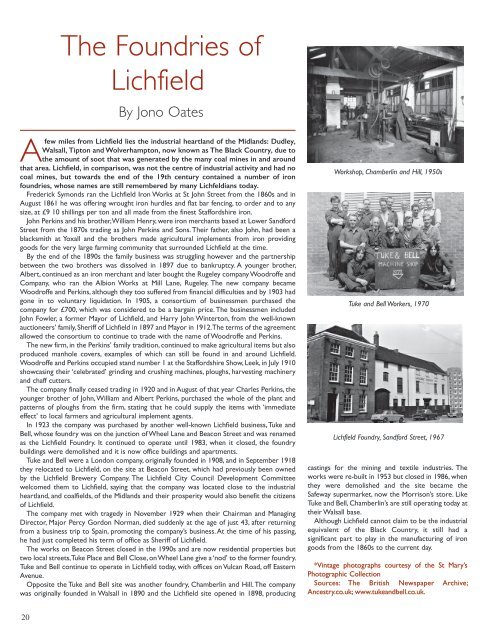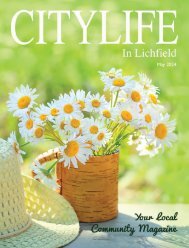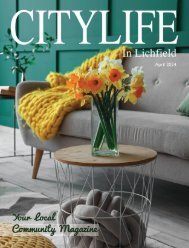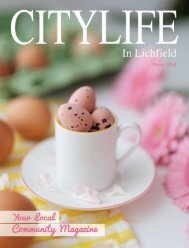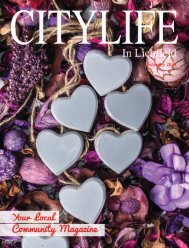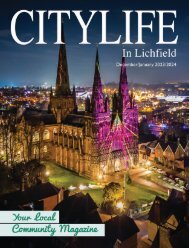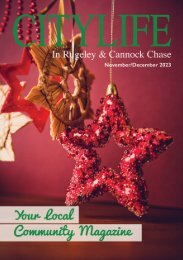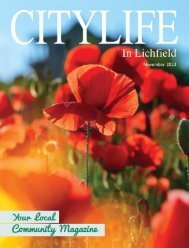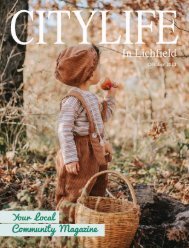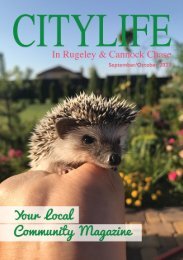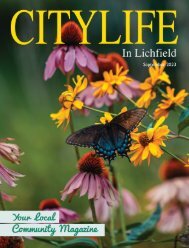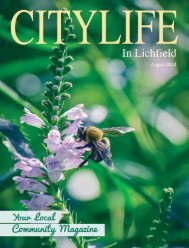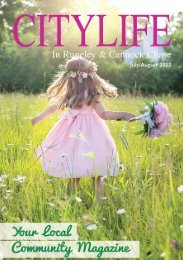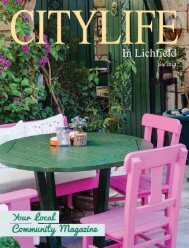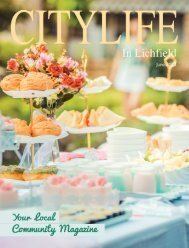Citylife in Lichfield November 2022
November is always the month of remembrance, when the nation falls silent to remember those who gave so much for their country, including those who fell during the Two World Wars, and our feature writer, Jono, tells the stories of some of the Fallen of Lichfield from World War Two. As always we have our usual mix of competitions, local news stories, What's On events, and we also recommend the best places for you to eat, drink, and buy gifts from, this Christmas. With the longer evenings, and colder days, wrap up warm, pour yourself a glass of mulled wine and enjoy reading our autumnal November magazine!
November is always the month of remembrance, when the nation falls silent to remember those who gave so much for their country, including those who fell during the Two World Wars, and our feature writer, Jono, tells the stories of some of the Fallen of Lichfield from World War Two. As always we have our usual mix of competitions, local news stories, What's On events, and we also recommend the best places for you to eat, drink, and buy gifts from, this Christmas. With the longer evenings, and colder days, wrap up warm, pour yourself a glass of mulled wine and enjoy reading our autumnal November magazine!
You also want an ePaper? Increase the reach of your titles
YUMPU automatically turns print PDFs into web optimized ePapers that Google loves.
The Foundries of<br />
<strong>Lichfield</strong><br />
By Jono Oates<br />
Afew miles from <strong>Lichfield</strong> lies the <strong>in</strong>dustrial heartland of the Midlands: Dudley,<br />
Walsall, Tipton and Wolverhampton, now known as The Black Country, due to<br />
the amount of soot that was generated by the many coal m<strong>in</strong>es <strong>in</strong> and around<br />
that area. <strong>Lichfield</strong>, <strong>in</strong> comparison, was not the centre of <strong>in</strong>dustrial activity and had no<br />
coal m<strong>in</strong>es, but towards the end of the 19th century conta<strong>in</strong>ed a number of iron<br />
foundries, whose names are still remembered by many Lichfeldians today.<br />
Frederick Symonds ran the <strong>Lichfield</strong> Iron Works at St John Street from the 1860s and <strong>in</strong><br />
August 1861 he was offer<strong>in</strong>g wrought iron hurdles and flat bar fenc<strong>in</strong>g, to order and to any<br />
size, at £9 10 shill<strong>in</strong>gs per ton and all made from the f<strong>in</strong>est Staffordshire iron.<br />
John Perk<strong>in</strong>s and his brother, William Henry, were iron merchants based at Lower Sandford<br />
Street from the 1870s trad<strong>in</strong>g as John Perk<strong>in</strong>s and Sons. Their father, also John, had been a<br />
blacksmith at Yoxall and the brothers made agricultural implements from iron provid<strong>in</strong>g<br />
goods for the very large farm<strong>in</strong>g community that surrounded <strong>Lichfield</strong> at the time.<br />
By the end of the 1890s the family bus<strong>in</strong>ess was struggl<strong>in</strong>g however and the partnership<br />
between the two brothers was dissolved <strong>in</strong> 1897 due to bankruptcy. A younger brother,<br />
Albert, cont<strong>in</strong>ued as an iron merchant and later bought the Rugeley company Woodroffe and<br />
Company, who ran the Albion Works at Mill Lane, Rugeley. The new company became<br />
Woodroffe and Perk<strong>in</strong>s, although they too suffered from f<strong>in</strong>ancial difficulties and by 1903 had<br />
gone <strong>in</strong> to voluntary liquidation. In 1905, a consortium of bus<strong>in</strong>essmen purchased the<br />
company for £700, which was considered to be a barga<strong>in</strong> price. The bus<strong>in</strong>essmen <strong>in</strong>cluded<br />
John Fowler, a former Mayor of <strong>Lichfield</strong>, and Harry John W<strong>in</strong>terton, from the well-known<br />
auctioneers’ family, Sheriff of <strong>Lichfield</strong> <strong>in</strong> 1897 and Mayor <strong>in</strong> 1912. The terms of the agreement<br />
allowed the consortium to cont<strong>in</strong>ue to trade with the name of Woodroffe and Perk<strong>in</strong>s.<br />
The new firm, <strong>in</strong> the Perk<strong>in</strong>s’ family tradition, cont<strong>in</strong>ued to make agricultural items but also<br />
produced manhole covers, examples of which can still be found <strong>in</strong> and around <strong>Lichfield</strong>.<br />
Woodroffe and Perk<strong>in</strong>s occupied stand number 1 at the Staffordshire Show, Leek, <strong>in</strong> July 1910<br />
showcas<strong>in</strong>g their ‘celebrated’ gr<strong>in</strong>d<strong>in</strong>g and crush<strong>in</strong>g mach<strong>in</strong>es, ploughs, harvest<strong>in</strong>g mach<strong>in</strong>ery<br />
and chaff cutters.<br />
The company f<strong>in</strong>ally ceased trad<strong>in</strong>g <strong>in</strong> 1920 and <strong>in</strong> August of that year Charles Perk<strong>in</strong>s, the<br />
younger brother of John, William and Albert Perk<strong>in</strong>s, purchased the whole of the plant and<br />
patterns of ploughs from the firm, stat<strong>in</strong>g that he could supply the items with ‘immediate<br />
effect’ to local farmers and agricultural implement agents.<br />
In 1923 the company was purchased by another well-known <strong>Lichfield</strong> bus<strong>in</strong>ess, Tuke and<br />
Bell, whose foundry was on the junction of Wheel Lane and Beacon Street and was renamed<br />
as the <strong>Lichfield</strong> Foundry. It cont<strong>in</strong>ued to operate until 1983, when it closed, the foundry<br />
build<strong>in</strong>gs were demolished and it is now office build<strong>in</strong>gs and apartments.<br />
Tuke and Bell were a London company, orig<strong>in</strong>ally founded <strong>in</strong> 1908, and <strong>in</strong> September 1918<br />
they relocated to <strong>Lichfield</strong>, on the site at Beacon Street, which had previously been owned<br />
by the <strong>Lichfield</strong> Brewery Company. The <strong>Lichfield</strong> City Council Development Committee<br />
welcomed them to <strong>Lichfield</strong>, say<strong>in</strong>g that the company was located close to the <strong>in</strong>dustrial<br />
heartland, and coalfields, of the Midlands and their prosperity would also benefit the citizens<br />
of <strong>Lichfield</strong>.<br />
The company met with tragedy <strong>in</strong> <strong>November</strong> 1929 when their Chairman and Manag<strong>in</strong>g<br />
Director, Major Percy Gordon Norman, died suddenly at the age of just 43, after return<strong>in</strong>g<br />
from a bus<strong>in</strong>ess trip to Spa<strong>in</strong>, promot<strong>in</strong>g the company’s bus<strong>in</strong>ess. At the time of his pass<strong>in</strong>g,<br />
he had just completed his term of office as Sheriff of <strong>Lichfield</strong>.<br />
The works on Beacon Street closed <strong>in</strong> the 1990s and are now residential properties but<br />
two local streets, Tuke Place and Bell Close, on Wheel Lane give a ‘nod’ to the former foundry.<br />
Tuke and Bell cont<strong>in</strong>ue to operate <strong>in</strong> <strong>Lichfield</strong> today, with offices on Vulcan Road, off Eastern<br />
Avenue.<br />
Opposite the Tuke and Bell site was another foundry, Chamberl<strong>in</strong> and Hill. The company<br />
was orig<strong>in</strong>ally founded <strong>in</strong> Walsall <strong>in</strong> 1890 and the <strong>Lichfield</strong> site opened <strong>in</strong> 1898, produc<strong>in</strong>g<br />
Workshop, Chamberl<strong>in</strong> and Hill, 1950s<br />
Tuke and Bell Workers, 1970<br />
<strong>Lichfield</strong> Foundry, Sandford Street, 1967<br />
cast<strong>in</strong>gs for the m<strong>in</strong><strong>in</strong>g and textile <strong>in</strong>dustries. The<br />
works were re-built <strong>in</strong> 1953 but closed <strong>in</strong> 1986, when<br />
they were demolished and the site became the<br />
Safeway supermarket, now the Morrison’s store. Like<br />
Tuke and Bell, Chamberl<strong>in</strong>’s are still operat<strong>in</strong>g today at<br />
their Walsall base.<br />
Although <strong>Lichfield</strong> cannot claim to be the <strong>in</strong>dustrial<br />
equivalent of the Black Country, it still had a<br />
significant part to play <strong>in</strong> the manufactur<strong>in</strong>g of iron<br />
goods from the 1860s to the current day.<br />
*V<strong>in</strong>tage photographs courtesy of the St Mary’s<br />
Photographic Collection<br />
Sources: The British Newspaper Archive;<br />
Ancestry.co.uk; www.tukeandbell.co.uk.<br />
20


